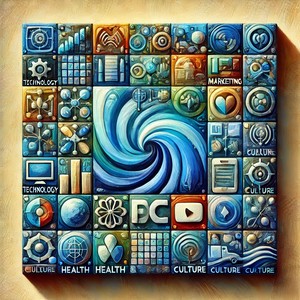0:00
what if your computer could think not in
0:02
ones or zeros but in both at once that's
0:05
the promise of quantum computing a
0:08
technology that challenges everything we
0:10
know about how machines compute store
0:13
and solve problems For decades classical
0:17
computers have been the backbone of our
0:19
digital world Every website you visit
0:22
every app you open every photo you take
0:25
these are all processed by computers
0:27
that use bits the smallest unit of data
0:31
which can only exist in a state of zero
0:33
or one Their logic is binary sequential
0:38
and very fast But no matter how advanced
0:41
they become classical computers are
0:44
bound by the limitations of binary
0:46
processing Quantum computers on the
0:48
other hand play by an entirely different
0:51
rule book Instead of bits they use
0:54
cubits which can exist in a state of
0:57
zero one or both at the same time thanks
1:00
to a quantum phenomenon called superp
1:03
position Add to that quantum
1:05
entanglement a mysterious link between
1:08
cubits that allows them to be connected
1:10
regardless of distance and suddenly you
1:13
have a machine that can process vast
1:16
combinations of information
1:18
simultaneously This difference is more
1:23
transformational A classical computer
1:25
might try every possible solution to a
1:28
problem one at a time A quantum computer
1:31
can evaluate many potential outcomes at
1:33
once making it ideal for solving
1:36
incredibly complex problems in
1:38
cryptography drug development financial
1:41
modeling and climate simulation But
1:45
quantum computers aren't meant to
1:47
replace classical ones At least not yet
1:50
They are better viewed as specialized
1:53
tools like a telescope compared to the
1:56
human eye Classical machines are still
1:58
more efficient and cost effective for
2:01
everyday tasks like browsing the web or
2:04
running office software Quantum systems
2:07
however shine when traditional machines
2:10
falter when problems grow exponentially
2:13
with each added variable Today's quantum
2:16
computers are still in their infancy
2:19
They are sensitive to environmental
2:21
noise errorprone and extremely difficult
2:24
to scale But as companies like IBM
2:27
Google and emerging startups continue to
2:30
refine the technology hybrid systems
2:34
where quantum and classical computers
2:36
work together are emerging as the new
2:39
frontier Understanding the distinction
2:42
between classical and quantum computing
2:44
isn't just for physicists or tech
2:47
insiders anymore As quantum applications
2:50
begin to touch industries we all rely on
2:54
being informed means being prepared for
2:56
a shift that may redefine how we
2:59
interact with technology itself Which
3:02
potential application of quantum
3:04
computing do you think will impact your

